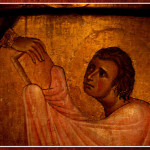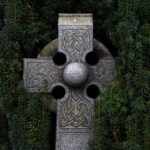We run our website the way we wished the whole internet worked: we provide high quality original content with no ads. We are funded solely by your direct support. Please consider supporting this project.
Revelation 13:8 refers to “everyone whose names have not been written before the foundation of the world in the book of life.” How does that square with open theism?
Three possibilities exist in terms of reconciling Revelation 13:8 with open theism.
1) First, the “from the foundation of the world” clause can attach to either “everyone whose names have not been written” or to “the lamb that was slain.” For example, the TNIV translates this passage “All inhabitants of the earth will worship the beast—all whose names have not been written in the Lamb’s book of life, the Lamb who was slain from the creation of the world. ” So it is with many translations of this passage. If this is correct, the passage suggests that the crucifixion of Christ was part of Gods’ plan from the beginning, but not that people’s names were or were not written in “the book of life” from the foundation of the world.
2) The phrase “from the foundation” (apo kataboleis) can mean “from before” or “from the time of” (=since). So even if we attach the phrase to “everyone whose name has not been written…” the passage need only refer to those who didn’t enter into eternal life from the beginning of the world – that is, throughout history. As history progresses, God (metaphorically of course) puts into his “book of life” all people who enter into a life-giving relationship with him.
3) Several times in Scripture God warns people that he may blot their names out of the book of life (Exod. 32:33; Rev. 3:5, cf. Rev. 22:18). In this light, it seems we should not think that having one’s name in or out of “the book of life” is a permanent thing. On a side note, if names were written (or not written?) in the book of life before the world began, and if one can’t add or detract from this book, one might legitimately wonder what these passages mean.
Applied to the foreknowledge debate, if God foreknew from all eternity that certain names would be “blotted out” of his book, one has to wonder why God bothered to put them there in the first place? If God may indeed “take away [a]… person’s share in the tree of life and in the holy city” (Rev. 22:19), and God knew this would happen, why did he give them a share in the first place? If names can be added and/or deleted from the book of life, it suggests that the eternal destiny of these people was not fixed in God’s mind (=in “the book”) from the start .
Category: Q&A
Tags: Bible, Free Will, New Testament, Open Theism, Predestination, Q&A, Responding to Calvinism, Revelation
Topics: End Times, Providence, Predestination and Free Will, Responding to Objections
Verse: Revelation 13
Related Reading

Part 3: Disarming Flood’s Inadequate Conception of Biblical Authority
Image by Ex-InTransit via Flickr In this third part of my review of Derek Flood’s Disarming Scripture I will offer a critique of his redefined conception of biblical inspiration and authority. I will begin by having us recall from Part I that Flood holds up “faithful questioning” over “unquestioning obedience” as the kind of faith that Jesus…

What is the significance of 2 Chronicles 7:12–14?
The Lord says to Solomon, “When I shut up the heavens so that there is no rain, or command the locust to devour the land, or send pestilence among my people, if my people who are called by my name humble themselves, pray, seek my face, and turn from their wicked ways, then I will…

How do you respond to Jeremiah 1:5
The Lord says to Jeremiah, “Before I formed you in the womb I knew you, and before you were born I consecrated you; I appointed you a prophet to the nations.” This verse shows God’s love and plan for Jeremiah before he was born. This does not imply that Jeremiah could not have “rejected God’s…

God’s Moral Immutability
Classical theologians from the fourth and fifth centuries on were very concerned with protecting their understanding of the metaphysical attributes of God—like timelessness, immutability, impassibility—by assessing biblical portraits that conflicted with these attributes to be accommodations. However, once we resolve that all our thinking about God must be anchored in the cross, our primary concern…

An Omni-Resourceful God
It is quite common for us to talk about the attributes of God as omnipotent (all-powerful), omniscient (all-knowing) and omni-present (present everywhere), but what about God’s unlimited resourcefulness? Consider the story of Moses’ commission in Exodus 3 and 4. Here the Lord instructs Moses to tell the elders of Israel that the Lord has heard…

A Dialogue with Derek Flood: Is the Bible Infallible?
I’m happy to see that Derek Flood has responded to my four part review of his book, Disarming Scripture. His response—and, I trust, this reply to his response—models how kingdom people can strongly disagree on issues without becoming acrimonious. And I am in full agreement with Derek that our shared conviction regarding the centrality of…
